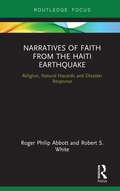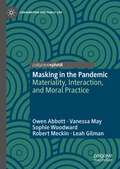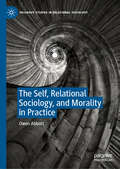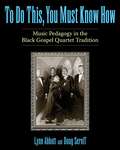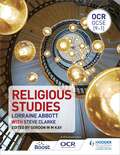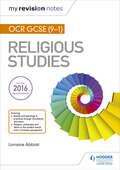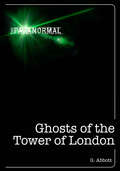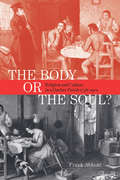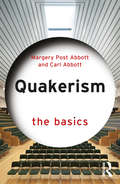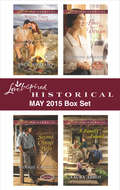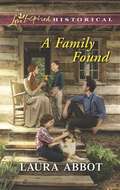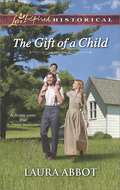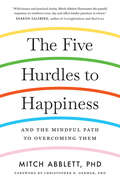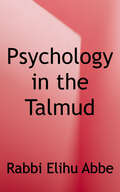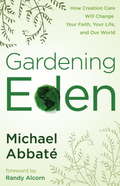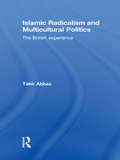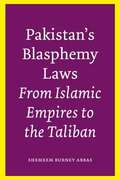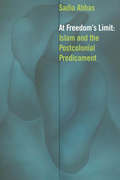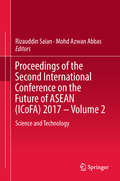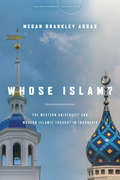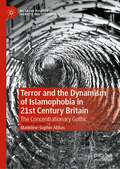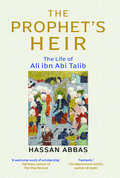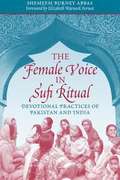- Table View
- List View
Narratives of Faith from the Haiti Earthquake: Religion, Natural Hazards and Disaster Response (Routledge Focus on Religion)
by Roger Philip Abbott Robert S. WhiteThis book presents an in-depth ethnographic case study carried out in the years following the 2010 Haiti earthquake to present the role of faith beliefs in disaster response. The earthquake is one of the most destructive on record, and the aftermath, including a cholera epidemic and ongoing humanitarian aid, has continued for years following the catastrophe. Based on dozens of interviews, this book gives primacy to survivors’ narratives. It begins by laying out the Haitian context, before presenting an account of the earthquake from survivors’ perspectives. It then explores in detail how the earthquake affected the religious, mainly Christian, faith of survivors and how religious faith influenced how they responded to, and are recovering from, the experience. The account is also informed by geoscience and the accompanying "complicating factors." Finally, the Haitian experience highlights the significant role that religious faith can play alongside other learned coping strategies in disaster response and recovery globally. This book contributes an important case study to an emerging literature in which the influence of both religion and narrative is being recognised. It will be of interest to scholars of any discipline concerned with disaster response, including practical theology, anthropology, psychology, geography, Caribbean studies and earth science. It will also provide a resource for non-governmental organisations.
Masking in the Pandemic: Materiality, Interaction, and Moral Practice (Consumption and Public Life)
by Owen Abbott Vanessa May Sophie Woodward Robert Meckin Leah GilmanThis book assumes an “everyday life” perspective towards masking in public spaces in the UK during the Covid-19 pandemic. Facemasks are perhaps one of the most tangible ways in which the changes wrought by the Covid-19 pandemic were made visible. In the space of a few months in 2020, masking in the UK went from being almost non-existent in public to becoming widespread, both before and after the UK government mandated masking in most enclosed public spaces in July 2020. In this context, the speed and scale of the introduction of masking in public settings offers sociologists a rare chance to document the (contested) emergence of a new social practice. We argue that the nature of masking during the pandemic means that masking practices need to be understood through the entwinement of material, interactional, and moral dimensions. We develop a relational perspective to explore the relationship between the materiality and moral significance of masking, and how this translated into the development of masking practices in public spaces. The authors argue further that the specific context of masking during the pandemic provides sociologists with a unique lens to think through the nature of material, interactional, and moral practices in general.
The Self, Relational Sociology, and Morality in Practice (Palgrave Studies in Relational Sociology)
by Owen AbbottProviding a theory of moral practice for a contemporary sociological audience, Owen Abbott shows that morality is a relational practice achieved by people in their everyday lives. He moves beyond old dualisms—society versus the individual, social structure versus agency, body versus mind—to offer a sociologically rigorous and coherent theory of the relational constitution of the self and moral practice, which is both shared and yet enacted from an individualized perspective. In so doing, The Self, Relational Sociology, and Morality in Practice not only offers an urgently needed account of moral practice and its integral role in the emergence of the self, but also examines morality itself within and through social relations and practices. Abbott’s conclusions will be of interest to social scientists and philosophers of morality, those working with pragmatic and interactionist approaches, and those involved with relational sociology and social theory.
To Do This, You Must Know How: Music Pedagogy in the Black Gospel Quartet Tradition (American Made Music Series)
by Lynn Abbott Doug SeroffTo Do This, You Must Know How traces black vocal music instruction and inspiration from the halls of Fisk University to the mining camps of Birmingham and Bessemer, Alabama, and on to Chicago and New Orleans. In the 1870s, the Original Fisk University Jubilee Singers successfully combined Negro spirituals with formal choral music disciplines and established a permanent bond between spiritual singing and music education. Early in the twentieth century there were countless initiatives in support of black vocal music training conducted on both national and local levels. The surge in black religious quartet singing that occurred in the 1920s owed much to this vocal music education movement. In Bessemer, Alabama, the effect of school music instruction was magnified by the emergence of community-based quartet trainers who translated the spirit and substance of the music education movement for the inhabitants of working-class neighborhoods. These trainers adapted standard musical precepts, traditional folk practices, and popular music conventions to create something new and vital Bessemer's musical values directly influenced the early development of gospel quartet singing in Chicago and New Orleans through the authority of emigrant trainers whose efforts bear witness to the effectiveness of “trickle down” black music education. A cappella gospel quartets remained prominent well into the 1950s, but by the end of the century the close harmony aesthetic had fallen out of practice, and the community-based trainers who were its champions had virtually disappeared, foreshadowing the end of this remarkable musical tradition.
OCR GCSE (9-1) Religious Studies
by Lorraine Abbott Steve ClarkeExam Board: OCRLevel: GCSESubject: RSFirst Teaching: September 2016First Exam: June 2018Motivate every student to deepen their understanding and fulfil their potential by following a stimulating, well-paced course through the strengthened content requirements; produced by subject specialists and OCR's Publishing Partner.- Equips students with the detailed knowledge they need to succeed with clear, lively explanations that make key concepts accessible to all ability levels.- Provides opportunities for students to learn, review and develop their knowledge and skills through a variety of engaging activities, discussion points and extension tasks to stretch high achievers.- Ensures that your lessons are both innovative and inclusive, supplying a bank of tasks that draw on best practice teaching methods.- Encourages students to take an active interest in every topic, using relevant news articles, real-life viewpoints and quotations from sacred texts to bring religious principles and practices to life.- Boosts students' confidence approaching assessment via practice questions and guidance on tackling different question types.- Enables you to teach the systematic study content confidently with comprehensive coverage of Christianity and Islam.OCR GCSE RS Spec Content covered:Christianity- Beliefs and teachings- PracticesIslam- Beliefs and teachings- PracticesReligion, philosophy and ethics in the modern world from a Christian perspective- Relationships and families- The existence of God- Religion, peace and conflict- Dialogue between religious and non-religious beliefs and attitudes- Covers the short course content.
My Revision Notes OCR GCSE (9-1) Religious Studies
by Lorraine AbbottTarget success in OCR GCSE Religious Studies with this proven formula for effective, structured revision; key content coverage is combined with exam-style tasks and practical tips to create a revision guide you can rely on to review, strengthen and test their knowledge.With My Revision Notes you can:- Plan and manage a successful revision programme using the topic-by-topic planner- Consolidate subject knowledge by working through clear and focused content coverage- Test understanding and identify areas for improvement with regular 'Now Test Yourself' tasks (with answers online)- Improve exam technique through practice questions and expert tips
My Revision Notes OCR GCSE (9-1) Religious Studies
by Lorraine AbbottExam board: OCRLevel: GCSESubject: Religious StudiesFirst teaching: September 2016First exams: Summer 2018Target success in OCR GCSE Religious Studies with this proven formula for effective, structured revision; key content coverage is combined with exam-style tasks and practical tips to create a revision guide you can rely on to review, strengthen and test their knowledge.With My Revision Notes you can:- Plan and manage a successful revision programme using the topic-by-topic planner- Consolidate subject knowledge by working through clear and focused content coverage- Test understanding and identify areas for improvement with regular 'Now Test Yourself' tasks (with answers online)- Improve exam technique through practice questions and expert tips
Ghosts of the Tower of London (The Paranormal)
by G. AbbottThe Tower of London's most horrific tragedies are well known; the gruesome deaths of the two boy princes in the Bloody Tower, Anne Boleyn's execution, the Jesuit priests and heretics who suffered the agonies of the rack and thumbscrew. Is it any wonder then, that there are frequent reports of blood curdling screams and moans, of unexplained footsteps and ghostly headless figures? Here, recorded for the first time, is an account for all to read#151;but preferably not at night#151;when you only think you are alone! The Paranormal, the new ebook series from F&W Media International Ltd, resurrecting rare titles, classic publications and out-of-print texts, as well as new ebook titles on the supernatural#151;other-worldly books for the digital age. The series includes a range of paranormal subjects from angels, fairies and UFOs to near-death experiences, vampires, ghosts and witchcraft.
Body or the Soul?: Religion and Culture in a Quebec Parish, 1736-1901
by Frank A. AbbottThere are many analyses of Tractarianism - a nineteenth-century form of Anglicanism that emphasized its Catholic origins - but how did people in the colonies react to the High Church movement? Beating against the Wind, a study in nineteenth-century vernacular spirituality, emphasizes the power of faith on a shifting frontier in a transatlantic world. Focusing on people living along the Newfoundland and Labrador coast, Calvin Hollett presents a nuanced perspective on popular resistance to the colonial emissary Bishop Edward Feild and his spiritual regimen of order, silence, and solemnity. Whether by outright opposing Bishop Feild, or by simply ignoring his wishes and views, or by brokering a hybrid style of Gothic architecture, the people of Newfoundland and Labrador demonstrated their independence in the face of an attempt at hierarchical ascendency upon the arrival of Tractarianism in British North America. Instead, they continued to practise evangelical Anglicanism and participate in Methodist revivals, and thereby negotiated a popular Protestantism, one often infused with the spirituality of other seafarers from Nova Scotia and New England. Exploring the interaction between popular spirituality and religious authority, Beating against the Wind challenges the traditional claim of Feild's success in bringing Tractarianism to the colony while exploring the resistance to Feild's initiatives and the reasons for his disappointments.
Body or the Soul?: Religion and Culture in a Quebec Parish, 1736-1901 (McGill-Queen's Studies in the History of Religion #2)
by Frank A. AbbottIn the two centuries before the Quiet Revolution, the people of Quebec exercised a higher degree of independence from the Catholic Church than is often presumed. Investigating rural Quebec from the mid-eighteenth century to the turn of the twentieth, Frank Abbott argues convincingly that the obligations and priorities of the Church did not unswervingly rule the lives of its parishioners. The Body or the Soul? is a history of religious and cultural life in the parish of St-Joseph-de-Beauce. Drawing from their pastors' detailed annual reports to the archbishops of Quebec, St-Joseph’s parish registers, contemporary accounts, government censuses, and the largely unexplored oral testimony on rural life and culture found in the Archives de folklore et ethnologie at Université Laval, Abbott assesses the nature and degree of influence and control that the church exerted over the everyday lives of a rural Quebec community. He examines the telling details found in church building projects, the relationships between clergy and parishioners, attendance at Sunday mass and catechism classes, reception of communion, the persistence of what the Church termed “superstition,” traditional customs of sociability, and the degree of control that the Church exerted over the community’s social and sexual behaviour. Rich with primary sources, The Body or the Soul? reveals the tensions between Catholicism’s place in people’s lives and the independent spirit of a vigorous popular culture.
Quakerism: The Basics (The Basics)
by Carl Abbott Margery Post AbbottQuakerism: The Basics is an accessible and engaging introduction to the history and diverse approaches and ideas associated with the Religious Society of Friends. This small religion incorporates a wide geographic spread and varied beliefs that range from evangelical Christians to non-theists. Topics covered include: Quaker values in action The first generations of Quakerism Quakerism in the eighteenth and nineteenth centuries Belief and activism Worship and practice Quakerism around the world The future of Quakerism. With helpful features including suggested readings, timelines, a glossary, and a guide to Quakers in fiction, this book is an ideal starting point for students and scholars approaching Quakerism for the first time as well as those interested in deepening their understanding.
Love Inspired Historical May 2015 Box Set
by Laura Abbot Winnie Griggs Lacy Williams Christine JohnsonLove Inspired Historical brings you four new titles for one great price, available now! This Love Inspired Historical bundle includes Wagon Train Sweetheart by Lacy Williams, Second Chance Hero by Winnie Griggs, Love by Design by Christine Johnson and A Family Found by Laura Abbot.Look for 4 new inspirational suspense stories every month from Love Inspired Historical!
A Family Found
by Laura AbbotA Mother for His Sons Single father and rancher Tate Lockwood already has his hands full-and now he's been asked to escort a woman through the Western frontier! But beautiful Sophie Montgomery is as strong-willed as she is brave. And although she's not the conventional tutor he wants for his sons, she just might be the perfect fit. Sophie, still recovering from heartbreak, is ready to start life afresh. And that includes a startling new ambition-climbing Longs Peak in the Colorado Rockies-as well as teaching Tate's boys. When she starts to fall for this motherless family, Tate, who's suffered losses of his own, is reluctant to return her feelings. And yet, maybe they can help each other navigate the terrain of newfound love...
The Gift of a Child
by Laura AbbotA Family All Her Own At twenty-seven, Rose Kellogg knows it's unlikely that she'll ever marry. Her dreams of motherhood seem hopeless. Until she rescues Alf, a young boy abandoned in her father's barn in Cottonwood Falls, Kansas. In Alf, Rose finally has hope again, and she's not alone.... Cattle rancher Seth Montgomery always felt awkward around people, but that's not the case with Rose and Alf. Seth instantly bonds with the shy boy and is eager to help Rose make her dream of a family come true. But when their future with Alf is threatened, will Seth and Rose find the courage to embrace the love they've found in each other?
The Five Hurdles to Happiness: And the Mindful Path to Overcoming Them
by Mitch AbblettA practical approach to becoming aware of the "five hindrances"--the negative qualities that inhibit living the awakened life--and to breaking free of them in order to live more mindfully, effectively, compassionately.Five obstacles stand in between you and true happiness. What are they and how can you overcome them? Buddhist traditions teach that there are five negative qualities, or hindrances, that inhibit people from living an awakened life. Here, Mitch Abblett gives this teaching a modern, secular interpretation and helps you identify the hurdles that are blocking your contentment—desire, hostility, sluggishness, worry, and doubt—and how you can take your first steps to overcoming them. Combining traditional wisdom with contemporary psychology and using examples from his psychotherapy practice, Abblett uses the hurdles as a frame for engaging you in a process of contemplating your own life and learning to lean into your experience rather than merely repeating bad habits. By doing this, you can break free from the hurdles and live more mindfully, effectively, and compassionately.
Psychology in the Talmud: Guidelines for Simchah and Personal Growth
by Rabbi Elihu AbbeThis book uncovers important insights from the Jewish tradition and offers tools for success, joy, growth, and inspiration. Timeless ideas are elaborated on from the writings of classical Torah commentaries as well as current leaders in the fields of psychology and personal growth. Short summaries enable readers to more easily implement these crucial concepts into their lives.
Gardening Eden: How Creation Care Will Change Your Faith, Your Life, and Our World
by Michael AbbateBefore the snake,the apple,and the Ten Commandments,God created a garden..."Spiritual environmentalism" did not start out as an oxymoron-it was an invitation. Yet today, many believe God's first job description for humankind has been replaced by other "worthier pursuits". Why has this simple instruction become so controversial? How does one sort through all the mixed messages? Is changing our lives to save the world really our responsibility-or even possible?Gardening Eden invites you to consider a new, spiritual perspective to practical environmentalism. The question is not whether our souls find expression and inspiration in our incredible planet, but how best to preserve that fundamental connection. Green living is no longer a fad-simple lifestyle solutions are now available to everyone. Discover creation care as an act of worship and a call to deeper harmony with our Creator, our fellow gardeners, and our living Earth. Gardening Eden is the primer in how this shift will transform not only our world, but your very soul.From the Trade Paperback edition.
Islamic Radicalism and Multicultural Politics: The British Experience
by Tahir AbbasThe expression of an Islamic political radicalism in Britain has been one of the most dramatic developments in recent decades. Islamic Radicalism and Multicultural Politics explores the nature of this phenomenon by analysing the origins of Islam and its historical contact with Western Europe and Britain, and the emergence of Islamic political radicalism in the Muslim world and in the West. Tahir Abbas draws on historical analysis and contemporary case studies to explore the post-war immigration and integration of Muslim groups, the complex relations that exist between a secular liberal Britain and a diverse but multifaceted Islam, and the extent of social and economic inequalities that affect Muslims as individual citizens and in local area communities. He shows how violent extremism among British Muslims is in reality influenced by a range of issues, including the factors of globalisation and contemporary politics, media and culture. Analysing and dissecting public policy, Abbas offers suggestions for tackling the major social, political and economic questions facing British Muslims in the post-7/7 era. An important contribution to the study of religion, ‘race’ and ethnicity in modern Britain, this accessible work will be of interest to anyone working in the field of Islamic studies, sociology and political radicalism. Cover design by Mahtab Hussain, www.mahtabhussain.com
Pakistan's Blasphemy Laws: From Islamic Empires to the Taliban
by Shemeem Burney AbbasUnder the guise of Islamic law, the prophet Muhammad's Islam, and the Qur'an, states such as Pakistan, Afghanistan, Egypt, Saudi Arabia, and Bangladesh are using blasphemy laws to suppress freedom of speech. Yet the Prophet never tried or executed anyone for blasphemy, nor does the Qur'an authorize the practice. Asserting that blasphemy laws are neither Islamic nor Qur'anic, Shemeem Burney Abbas traces the evolution of these laws from the Islamic empires that followed the death of the Prophet Muhammad to the present-day Taliban. Her pathfinding study on the shari'a and gender demonstrates that Pakistan's blasphemy laws are the inventions of a military state that manipulates discourse in the name of Islam to exclude minorities, women, free thinkers, and even children from the rights of citizenship. Abbas herself was persecuted under Pakistan's blasphemy laws, so she writes from both personal experience and years of scholarly study. Her analysis exposes the questionable motives behind Pakistan's blasphemy laws, which were resurrected during General Zia-ul-Haq's regime of 1977-1988--motives that encompassed gaining geopolitical control of the region, including Afghanistan, in order to weaken the Soviet Union. Abbas argues that these laws created a state-sponsored "infidel" ideology that now affects global security as militant groups such as the Taliban justify violence against all "infidels" who do not subscribe to their interpretation of Islam. She builds a strong case for the suspension of Pakistan's blasphemy laws and for a return to the Prophet's peaceful vision of social justice.
At Freedom's Limit: Islam and the Postcolonial Predicament
by Sadia AbbasThe subject of this book is a new “Islam.” This Islam began to take shape in 1988 around the Rushdie affair, the collapse of the Berlin Wall in 1989, and the first Gulf War of 1991. It was consolidated in the period following September 11, 2001. It is a name, a discursive site, a signifier at once flexible and constrained—indeed, it is a geopolitical agon, in and around which some of the most pressing aporias of modernity, enlightenment, liberalism, and reformation are worked out. At this discursive site are many metonyms for Islam: the veiled or “pious” Muslim woman, the militant, the minority Muslim injured by Western free speech. Each of these figures functions as a cipher enabling repeated encounters with the question “How do we free ourselves from freedom?” Again and again, freedom is imagined as Western, modern, imperial—a dark imposition of Enlightenment. The pious and injured Muslim who desires his or her own enslavement is imagined as freedom’s other. At Freedom’s Limit is an intervention into current debates regarding religion, secularism, and Islam and provides a deep critique of the anthropology and sociology of Islam that have consolidated this formation. It shows that, even as this Islam gains increasing traction in cultural production from television shows to movies to novels, the most intricate contestations of Islam so construed are to be found in the work of Muslim writers and painters. This book includes extended readings of jihadist proclamations; postcolonial law; responses to law from minorities in Muslim-majority societies; Islamophobic films; the novels of Leila Aboulela, Mohammed Hanif, and Nadeem Aslam; and the paintings of Komail Aijazuddin.
Proceedings of the Second International Conference on the Future of ASEAN (ICoFA) 2017 – Volume 2: Science And Technology
by Mohd Azwan Abbas Rizauddin SaianThis book examines how business, the social sciences, science and technology will impact the future of ASEAN. Following the ASEAN VISION 2020, it analyses the issues faced by ASEAN countries, which are diverse, while also positioning ASEAN as a competitive entity through partnerships. On the 30th anniversary of ASEAN, all ASEAN leaders agreed to the establishment of the ASEAN VISION 2020, which delineates the formation of a peaceful, stable and dynamically developed region while maintaining a community of caring societies in Malaysia, Indonesia, Singapore, Brunei, Vietnam, Thailand, the Philippines, Myanmar, Laos and Cambodia. In keeping with this aspiration, Universiti Teknologi MARA Perlis took the initial steps to organise conferences and activities that highlight the role of the ASEAN region. The Second International Conference on the Future of ASEAN (ICoFA) 2017 was organised by the Office of Academic Affairs, Universiti Teknologi MARA Perlis, to promote more comprehensive integration among ASEAN members. This book, divided into two volumes, offers a useful guide for all those engaged in research on business, the social sciences, science and technology. It will also benefit researchers worldwide who want to gain more knowledge about ASEAN countries
Whose Islam?: The Western University and Modern Islamic Thought in Indonesia (Encountering Traditions)
by Megan Brankley AbbasIn this incisive new book, Megan Brankley Abbas argues that the Western university has emerged as a significant space for producing Islamic knowledge and Muslim religious authority. For generations, Indonesia's foremost Muslim leaders received their educations in Middle Eastern madrasas or the archipelago's own Islamic schools. Starting in the mid-twentieth century, however, growing numbers traveled to the West to study Islam before returning home to assume positions of political and religious influence. Whose Islam? examines the far-reaching repercussions of this change for major Muslim communities as well as for Islamic studies as an academic discipline. As Abbas details, this entanglement between Western academia and Indonesian Islam has not only forged powerful new transnational networks but also disrupted prevailing modes of authority in both spheres. For Muslim intellectuals, studying Islam in Western universities provides opportunities to experiment with academic disciplines and to reimagine the faith, but it also raises troubling questions about whether and how to protect the Islamic tradition from Western encroachment. For Western academics, these connections raise pressing ethical questions about their own roles in the global politics of development and Islamic religious reform. Drawing on extensive archival research from around the globe, Whose Islam? provides a unique perspective on the perennial tensions between insiders and outsiders in religious studies.
Terror and the Dynamism of Islamophobia in 21st Century Britain: The Concentrationary Gothic (Palgrave Politics of Identity and Citizenship Series)
by Madeline-Sophie AbbasThis book provides powerful insights into the dynamics, nature, and experiences of the terrors of counter-terrorism measures in the UK. Abbas links her analysis to wider concerns of nation construction and belonging; racial profiling and policing; the state of exception and pre-emptive counter-terrorism measures; community-based counter-terrorism measures; and restrictions to political engagement, freedom of speech and hate speech. What makes this work distinct is its advancement of an original framework - the Concentrationary Gothic - to delineate the racialised mechanisms of terror involved in the governance of Muslim populations in the ‘war on terror’ context. The book illuminates the various ways in which Muslims in Britain experience terror through racialised surveillance and policing strategies operating at state, group (inter- and intra-), and individual levels in diverse contexts such as the street, workplace, public transport and the home. Abbas situates these experiences within wider racial politics and theory, drawing connections to anti-Semitism, anti-blackness, anti-Irishness and whiteness, to provide a complex mapping of the ways in which racial terror has operated in both historical and contemporary contexts of colonialism, slavery, and the camp, and offering a unique point of analysis through the use of Gothic tropes of haunting, monstrosity and abjection. This vital work will be of interest to students and scholars across sociology, criminology, anthropology, terrorism studies, Islamic studies, and critical Muslim studies, researching race and racialisation, security, immigration, nationhood and citizenship.
The Prophet's Heir: The Life of Ali ibn Abi Talib
by Hassan AbbasThe life and legacy of one of Mohammad&’s closest confidants and Islam&’s patron saint: Ali ibn Abi Talib Ali ibn Abi Talib is arguably the single most important spiritual and intellectual authority in Islam after prophet Mohammad. Through his teachings and leadership as fourth caliph, Ali nourished Islam. But Muslims are divided on whether he was supposed to be Mohammad&’s political successor—and he continues to be a polarizing figure in Islamic history. Hassan Abbas provides a nuanced, compelling portrait of this towering yet divisive figure and the origins of sectarian division within Islam. Abbas reveals how, after Mohammad, Ali assumed the spiritual mantle of Islam to spearhead the movement that the prophet had led. While Ali&’s teachings about wisdom, justice, and selflessness continue to be cherished by both Shia and Sunni Muslims, his pluralist ideas have been buried under sectarian agendas and power politics. Today, Abbas argues, Ali&’s legacy and message stands against that of ISIS, Al-Qaeda, and Taliban.
The Female Voice in Sufi Ritual: Devotional Practices of Pakistan and India
by Abbas Shemeem BurneyThe female voice plays a more central role in Sufi ritual, especially in the singing of devotional poetry, than in almost any other area of Muslim culture. This research clarifies why the female voice is so important in Sufi practice and underscores the many contributions of women to Sufism and its rituals.
